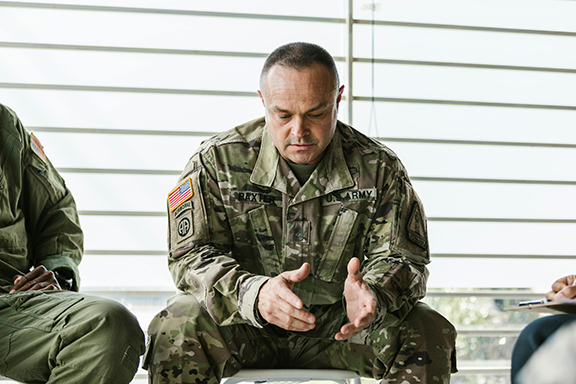Veterans advocates worry about VA staffing cuts

(Photo courtesy of Pexels)
MARQUETTE — Officials and experts in veteran services say they’re concerned about how staffing cuts in the U.S. Department of Veterans Affairs will affect Michigan veterans, especially those living in rural areas.
If the VA proceeds in the next 60 days with its recently announced reduction in staff, that inevitably will have a negative impact on veterans, said Barry Walther, of Owosso, the state quartermaster adjutant of the Michigan branch of the Veterans of Foreign Wars.
The VFW is an organization that helps veterans make claims for health care through Veterans Affairs.
“The question is, are we looking at cuts on the medical services or benefits or managerial/supervisory staff or frontline?” Walther said.
“Are wait times going to get worse? That depends on where the cuts will come from,” he said.
Walther said that there are different ways in which staffing cuts could affect those who depend on the department
He said his greatest concern is how cuts might lengthen the time it takes to process claims.
For example, over the last 18 months, he said, the VFW has seen longer processing times because claims have increased due to the 2022 PACT Act extending benefits to veterans exposed to contaminants during the Gulf War and other toxic exposures during their service.
Such exposure can cause long-term health damage that’s now being manifested as that population ages, he said.
“This is the worst possible time to see a reduction in staff,” he said.
Many federal agencies, as part of the Trump administration’s spending cuts, have already reduced recently hired or probationary personnel.
According to Walther, they include the people who do everyday clerical tasks with a direct impact on claim processing times.
“Cuts should be made with a scalpel and not a meat cleaver,” he said.
Other veterans’ advocates say the VA has been slow with services even before the new cuts.
One of them is Sandy Bower, the director of Vets Returning Home, a Roseville-based nonprofit dedicated to ending chronic homelessness among veterans.
“Wait times at VA hospitals have already been very long,” she said. “And the quality of care already wasn’t great, so, honestly, I can’t see that it will make much of a difference.”
According to Bower, it’s taken as long as 24 hours before the department returns a call.
“Trimming and cutting might force them to improve their efficiency,” she said.
Bower said she would prefer that veterans get medical treatment wherever they want to go, even if that is not at a VA-approved facility.
“They have to go to the VA hospital to get care,” she said. “If they have to wait more than a few days or have to travel a long distance. then they should be able to get private care.”
“Right now things are not getting better, but they are also not getting worse,” she said.
Trevor Wright, a service officer for Montcalm County’s Department of Veterans Affairs, agrees that veterans should be able to access local care, especially in rural areas.
“Sometimes our veterans wait up to 160 days for claims to be completed,” he said.
According to the National Center for Veterans Analysis and Statistics, there were 3,876 veterans in Montcalm County, and $16 million was spent on health care-related services to 1,176 patients there in 2023.
“Whether a vet has private insurance depends on what they did post-service. If they worked for an employer that offered insurance, they could obtain it that way,” Wright said.
“A 20-year retiree from the military can get free insurance, but that’s only a small number of soldiers,” he said. “Vets who become farmers or who work in agriculture, as many do in rural counties, often do not have employer-based insurance and can’t afford to purchase their own.”
If veterans come into his office without health insurance, the agency tries to get them enrolled through the VA, he said. That’s especially important for specialized care that would be too expensive to pay for out of pocket.
That can be a problem, both because of long wait times and because Montcalm County, like many rural counties, is far from a VA health care facility, Wright said.
“We are about an hour away from the nearest VA hospital,” he said. “Many veterans cannot drive themselves due to their age and condition and cannot afford transportation, so they have to ask for permission to seek local care.”
Veterans need VA approval before seeing a local doctor, he explained, and they don’t always get it in a timely fashion, or at all.
With VA staffing cuts, he says he’s concerned that such requests could take even longer to process, and veterans developing chronic conditions don’t always have that time.
“Someone starting to have mini-strokes can’t wait a month or more,” he said.
He said he hopes funding previously secured to build new community-based clinics won’t be cut.
Wright has driven patients to the VA facility himself because no other transportation was available.
He said that one veteran told him that he hadn’t had his medication in two years, and his private physician had told him that in six months he would have been dead.
“The VA wouldn’t approve the pharmacy-by-mail service for him because he hadn’t been seen by a VA doctor,” Wright said.
Pete Kasperowiz, the VA’s press secretary, said the department “will run through a deliberative process and find ways to improve care and benefits for veterans without cutting care and benefits for veterans.”
“We’re not talking about reducing medical staff or claims processors. We’re talking about reducing bureaucracy and inefficiencies that are getting in the way of customer convenience and service to veterans,” Kasperowicz said in an email.
“Meanwhile, all VA mission-critical positions are exempt from cuts, and hiring continues for more than 3000,000 essential positions,” he said.


